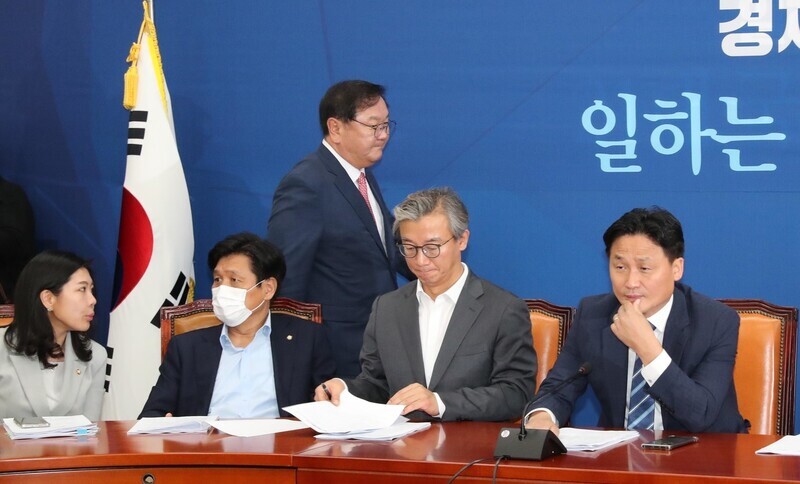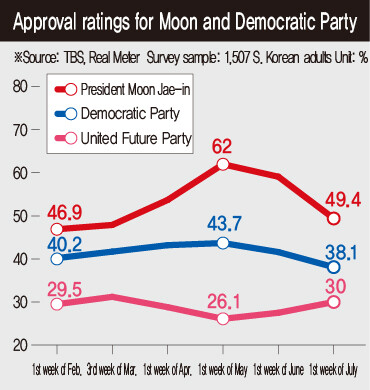hankyoreh
Links to other country sites 다른 나라 사이트 링크
Moon’s approval rating drops below 50% for first time in 3 months

South Korean President Moon Jae-in’s job approval rating has dropped below 50% for the first time in three months. The Democratic Party’s support has fallen along with it, reducing its lead over the United Future Party’s (UFP) to the single digits. The drop in the polls appears to be the result of public frustration with the tiff between Justice Minister Choo Mi-ae and Prosecutor General Yoon Seok-youl, rising real estate and rent prices, a controversy over the Incheon International Airport Corporation, and the Democratic Party’s monopolization of control over standing committees in the National Assembly. Party leadership says they’ll win back support by getting results, but the rank-and-file seem to be concerned that the party will be pushed back on the defensive, as it was before the COVID-19 crisis, unless it can somehow turn things around.
A Real Meter poll released on July 2 found that Moon’s job approval rating had fallen 3.9 percentage points from the previous week to 49.4%. The poll, commissioned by TBS, a Seoul broadcaster, polled 1,507 men and women around the country aged 18 and above over three days, beginning on June 29. The last time that Moon’s approval rating dipped below 50% was in the third week of March (49.3%), 15 weeks ago. Negative assessments of Moon’s job performance stood at 46.1%, up 3.4 percentage points from the previous week.

While the ruling Democratic Party had once enjoyed a 17 point lead over the opposition UFP, the gap in the two parties’ support ratings has narrowed to the single digits, also for the first time in 15 weeks. The Democratic Party’s support was at 38.1%, a decline of 3.1 points from the previous week. The UFP saw its support rise 1.9 points over the past week to 30%. The last time the UFP enjoyed 30% support was the fourth week of March. The Open Democratic Party received the support of 5.4% of voters, while the Justice Party had 5.2% and the People’s Party 2.7%. 16% of respondents didn’t support any party.
The ruling party’s declining support was driven by popular distaste with its unilateral exercise of power, exemplified by its taking control of nearly all the standing committees in the National Assembly. Other negative factors were the rift between Justice Minister Choo Mi-ae and Prosecutor-General Yoon Seok-youl, a controversy over Incheon Airport’s decision to convert irregular workers into regular workers, and rising tensions with North Korea.
Half of South Koreans think the Democratic Party shouldn’t have taken control of all standing committees except the Intelligence Committee. When Real Meter asked 500 men and women around the country aged 18 and above how they felt about the Democratic Party electing its own members to chair the standing committees, 50.7% of respondents said the ruling party had done the wrong thing when it disregarded the custom of reaching a bilateral agreement on the committee chairperson seats. Among respondents, 38.5% said the ruling party was in the right when it took responsibility for politics, and 10.7% said they weren’t sure.
When respondents were sorted into their ideological positions, 55.7% of conservatives and 54.1% of moderates said the Democratic Party’s decision was a mistake. Even among progressives, there wasn’t a big difference between approval (46%) and disapproval (43.1%) of the decision.
While promising to stay the course, Democratic Party leaders were clearly embarrassed by the poll results. “I think the ruling and opposition parties’ inability to stand together in the progress of fighting COVID-19 has impacted changes in support ratings. This was an unavoidable situation for the Democratic Party, and our only choice is to work hard to persuade the public we made the right choice anyway,” Kang Hun-sik, Democratic Party senior spokesperson, said in a telephone interview with the Hankyoreh.
Concerned lawmakers said they’d expected their support ratings would fall, but not so quickly. One multi-term lawmaker in the Seoul region said, “Despite poor external conditions and troubling signals, the party still seems tilted to one side. Looking at previous legislative sessions, something always goes wrong at times like this.”
“The party leaders are still giddy with their smashing victory in the general election, which has put them off their guard. At this rate, we could find ourselves back on the defensive, as we were prior to the coronavirus, before we even know what’s happening,” said one leading lawmaker in the party, voicing their concern.
By Lee Ji-hye, staff reporter
Please direct comments or questions to [english@hani.co.kr]

Editorial・opinion
![[Guest essay] Maybe Korea’s rapid population decline is an opportunity, not a crisis [Guest essay] Maybe Korea’s rapid population decline is an opportunity, not a crisis](https://flexible.img.hani.co.kr/flexible/normal/500/300/imgdb/original/2024/0430/9417144634983596.jpg) [Guest essay] Maybe Korea’s rapid population decline is an opportunity, not a crisis
[Guest essay] Maybe Korea’s rapid population decline is an opportunity, not a crisis![[Column] Can Yoon steer diplomacy with Russia, China back on track? [Column] Can Yoon steer diplomacy with Russia, China back on track?](https://flexible.img.hani.co.kr/flexible/normal/500/300/imgdb/original/2024/0430/1617144616798244.jpg) [Column] Can Yoon steer diplomacy with Russia, China back on track?
[Column] Can Yoon steer diplomacy with Russia, China back on track?- [Column] Season 2 of special prosecutor probe may be coming to Korea soon
- [Column] Park Geun-hye déjà vu in Yoon Suk-yeol
- [Editorial] New weight of N. Korea’s nuclear threats makes dialogue all the more urgent
- [Guest essay] The real reason Korea’s new right wants to dub Rhee a founding father
- [Column] ‘Choson’: Is it time we start referring to N. Korea in its own terms?
- [Editorial] Japan’s rewriting of history with Korea has gone too far
- [Column] The president’s questionable capacity for dialogue
- [Column] Are chaebol firms just pizza pies for families to divvy up as they please?
Most viewed articles
- 1Under conservative chief, Korea’s TRC brands teenage wartime massacre victims as traitors
- 2[Guest essay] Maybe Korea’s rapid population decline is an opportunity, not a crisis
- 3Dermatology, plastic surgery drove record medical tourism to Korea in 2023
- 4Value of Korean won down 7.3% in 2024, a steeper plunge than during 2008 crisis
- 5Thursday to mark start of resignations by senior doctors amid standoff with government
- 6Two factors that’ll decide if Korea’s economy keeps on its upward trend
- 7[Column] Can Yoon steer diplomacy with Russia, China back on track?
- 8Months and months of overdue wages are pushing migrant workers in Korea into debt
- 9First meeting between Yoon, Lee in 2 years ends without compromise or agreement
- 10Why Kim Jong-un is scrapping the term ‘Day of the Sun’ and toning down fanfare for predecessors